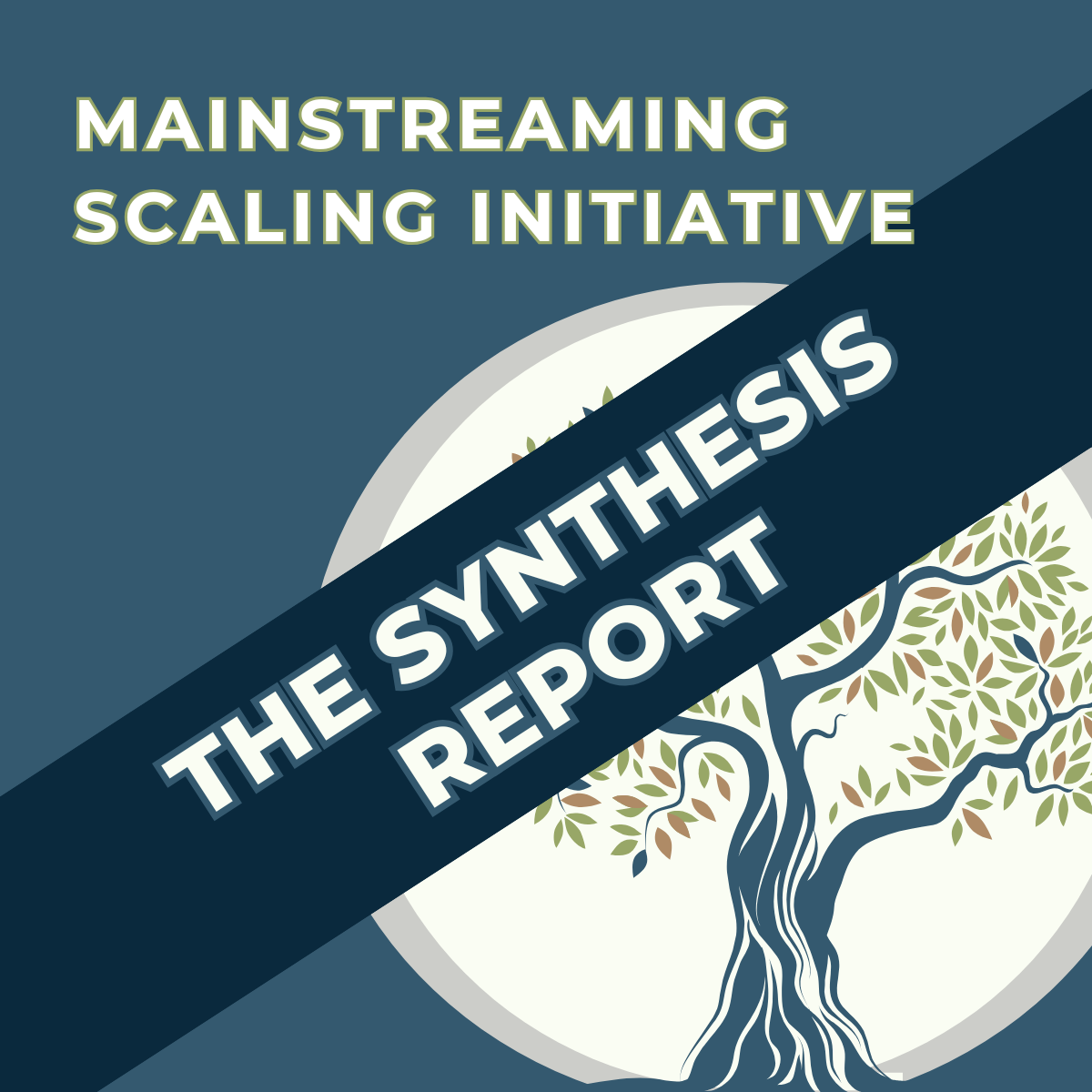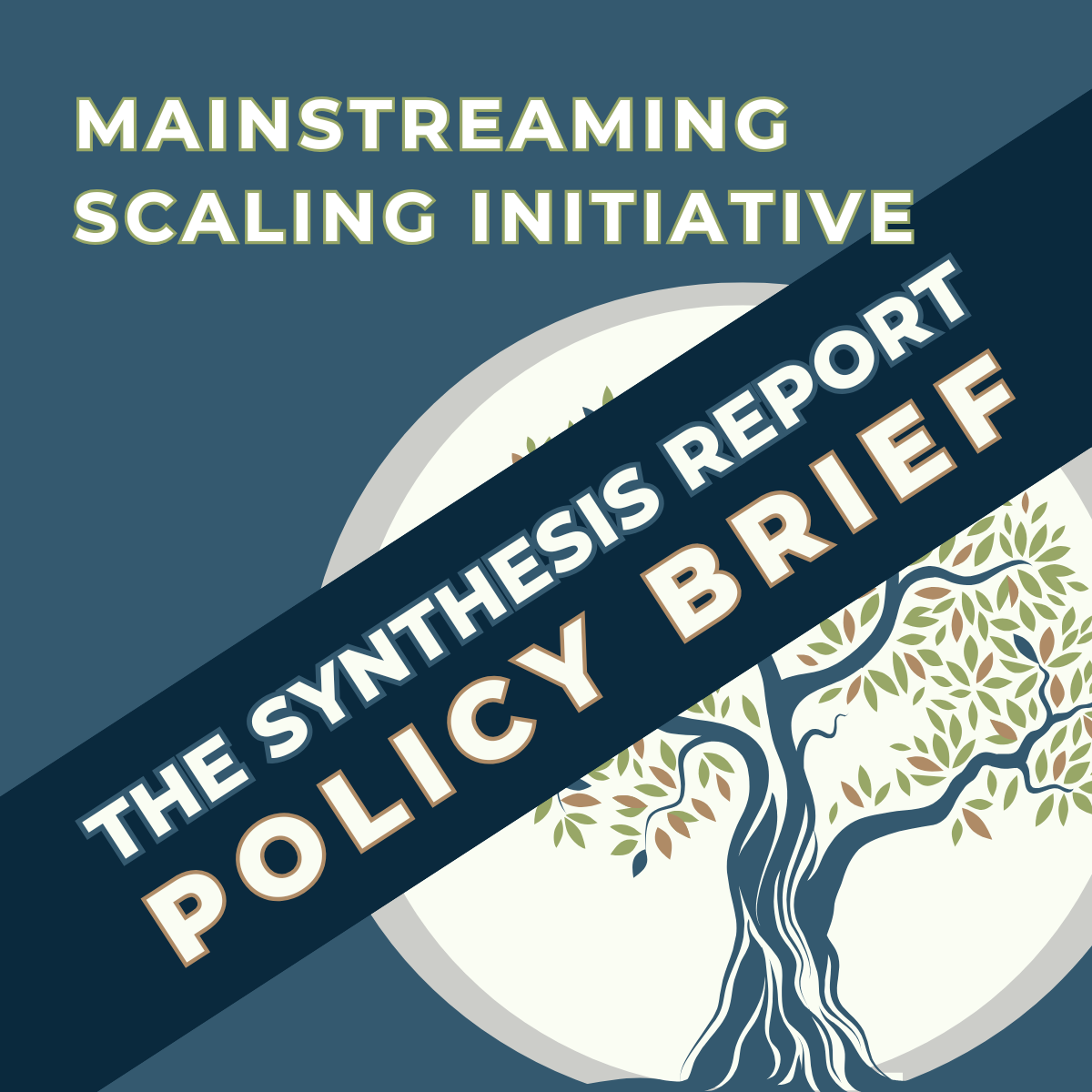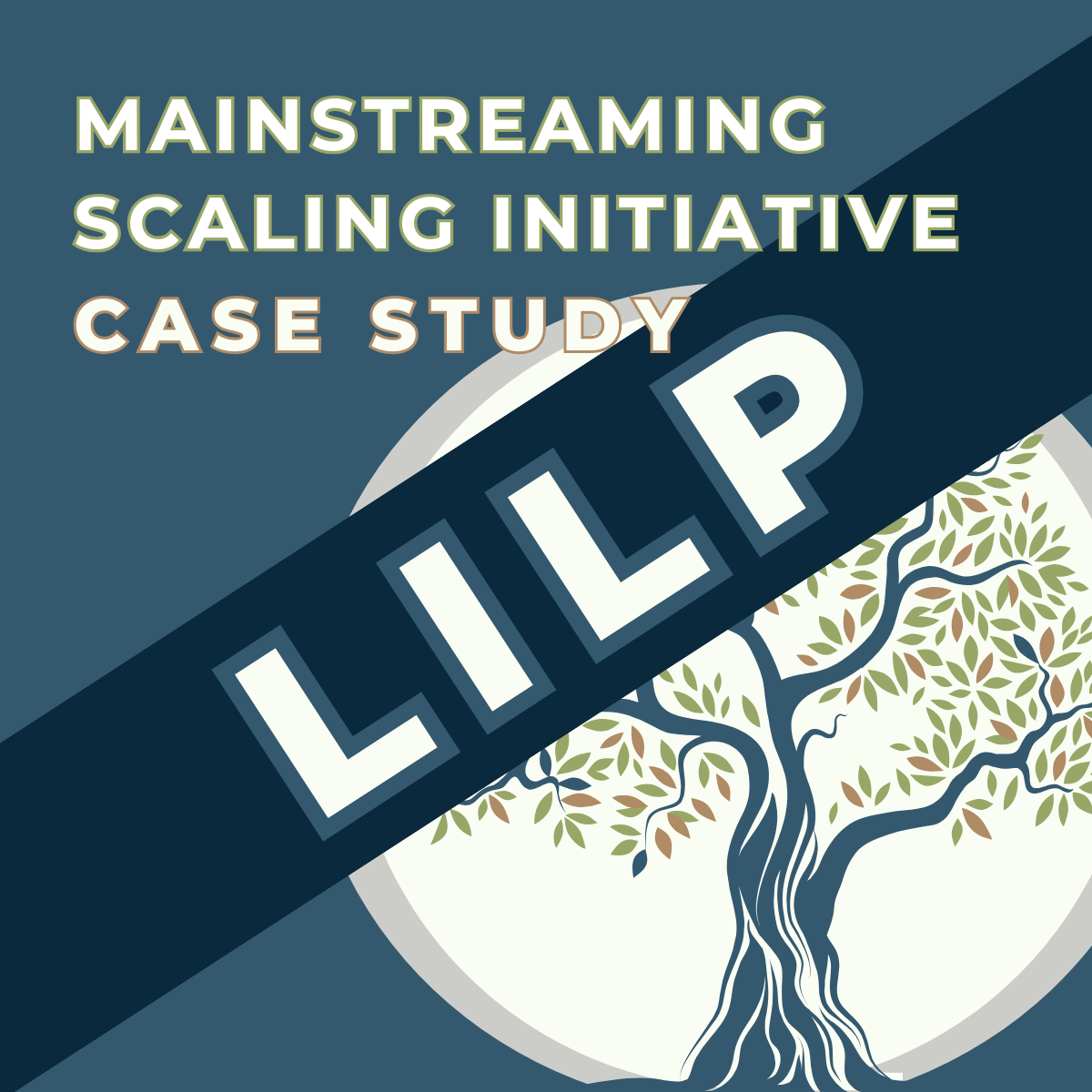Dear colleagues,
We are pleased to share with you Newsletter #15 of the Scaling Up Community of Practice (CoP).
In this Newsletter we report on the annual workshop of the CoP which took place on 24-25 October 2019
at the headquarters of Management Systems International. As you will see from the report, the discussion
was very substantive and fruitful. We are grateful to those who were able to attend and contributed greatly
to its success.
In addition, we report on recent activity of our eight working groups and present updates that members
have submitted on their scaling activities.
As usual, the Newsletter closes with a few publications and other relevant items that have come across our
desks. We are very grateful to all of you who have responded to our request for inputs.
We’re pleased to note that we soon be launching a dedicated CoP website that includes a consolidated
schedule of CoP and Working Group meetings along with interactive pages for each of the Working
Groups, and an associated social media platform for more informal exchanges among CoP members.
We also want to give you an early indication that we plan for our next two-day, in-person workshop for the
CoP participants to be held on October 23-24, 2020 in the Washington Metropolitan Area. Invitations will
be sent to you all during June 2020.
As always, we welcome your feedback or suggestions on this Newsletter and, more generally, on the CoP
and the working groups. And of course, we are grateful for your support, in-kind or financial, in making the
CoP a success for all of us.
With many thanks for your participation in the CoP,
Larry Cooley, MSI, and Johannes Linn, Brookings
filler space
Report on the Annual Workshop, October 24-25, 2019
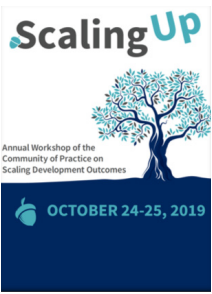
The Scaling Up Community of Practice (CoP) hosted its fourth annual workshop at the Management Systems International office in Arlington, VA. Some 75 participants coming from 56 organizations and 16 countries joined the event and participated in two days of stimulating discussions about their experiences with scaling up. This year, the CoP pioneered an Invited Fellows program, through which six of the eight working groups nominated an expert from the global south to attend the workshop.
The program began with two panels made up of the working group chairs and a third panel featuring the CoP’s Invited Fellows. These panels were followed by a collaborative agenda-setting session during which participants identified and prioritized key issues that merited further discussion for the remainder of the workshop; subsequent breakout sessions were held on these topics. The workshop concluded with a discussion of the future of the CoP, focusing mainly on its virtual presence. A summary of each session is provided below.
Session 1: Panel of Legacy Working Groups
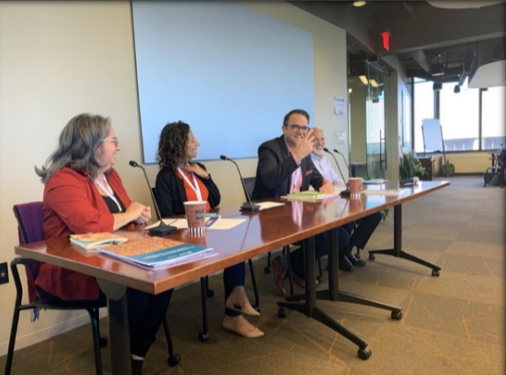
(Chaired by Laura Ghiron, ExpandNet)
Laura Ghiron chaired the first panel, consisting of the CoP’s five “legacy” working groups: Health, Education, Agriculture and Rural Development (ARD), M&E, and Scaling in Fragile States. These groups are chaired by Laura (ExpandNet), Nitika Tolani (MSI), Lennart Woltering (CIMMYT), Larry Cooley (MSI), and Jonathan Papoulidis (World Vision), respectively. The chairs reflected on the highlights of scaling in their group’s sector over the past year, including lessons they had learned and challenges they faced.
The Education Working Group focused on issues related to establishing partnerships and engagement with governments on their journey to scale. The Health group has been especially focused on resource-sharing related to adaptive learning and government engagement in an effort to avoid having to “reinvent the wheel”. For the ARD group, the focus has been on developing a new sourcebook with tools and articles on scaling. More generally, that ARD group noted the growing interest in scaling which has taken hold within the agriculture sector during the past year. The Fragile States working group has focused on the issue of social capital and on cases where normal market and government arrangements are compromised, often requiring the identification of alternative and local mechanisms of implementation. And the M&E group has had focused on tools for tracking and supporting scaling following initial proof of concept.
A shared challenge for many of the working groups is ensuring consistent engagement from members given the difficulty for many members of the working groups to participate in these meetings and the challenges of meaningfully disseminating the information discussed to those who are unable to attend. Another challenge that multiple working groups face is that of having a common definition of scaling. While the term is becoming widely used, the meaning of the word often ends up changing depending on the topic. While the survey Hartmann-Linn paper, the MSI publication on Scaling Up – From Vision to Large-Scale Change, and the recently-published book Scaling Impact by McLean and Gargani, provided frameworks around which to discuss the definitions of scaling during the workshop, the CoP as an entity has not adopted a single definition.
Session 2: Panel of Newly-Established Working Groups
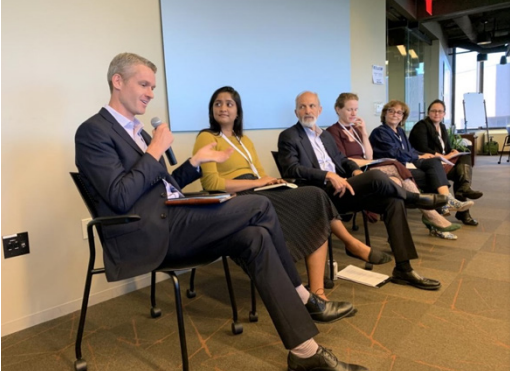
(Chaired by Larry Cooley, MSI)
The co-chairs of the newly-established working groups served as panelists for a discussion-based session, offering perspectives on scaling as related to their sectors from the last year and suggesting priorities to be pursued in the coming year. The three newly-established working groups are Nutrition, Social Enterprise, and Youth Employment, chaired by Chytanya Kompala (Eleanor Crook Foundation) and Dylan Walters (Nutrition International), Isabel Guerrero (IMAGO Global Grassroots) and Elaine Tinsley (World Bank), and Liz Vance (IYF) and Alice Gugelev (Global Development Incubator), respectively.
A feature shared by all three newly-established working groups is the multi-sectoral nature of the areas in which they work. The panelists noted that the cross-cutting nature of issues faced in these areas further intensifies the existing tension between an intervention’s complexity and scalability. This provoked a discussion about the pros and cons, and the nuances, of different strategies for addressing this issue.
One panelist noted success in increasing the scale of interventions in the youth employment sector by focusing on transforming the existing systems that connect youth to opportunity, rather than trying to transform the lives of youth directly. This focus on systems rather than projects was echoed by others on the panel. There was also a lively discussion among panelists and a plenary discussion about the role of intermediaries in these interventions, and the related challenge that comes with scaling up in the absence of viable intermediation.
Session 3: Broadening the Reach of the CoP
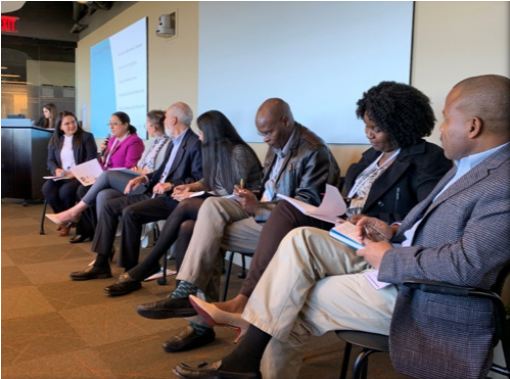
(Chaired by Larry Cooley, MSI)
In each of the previous three Annual CoP workshops, the community took reflected on the underrepresentation of voices from the countries that are being discussed. Funding from GIZ made it possible this year to address this issue by allowing each working group to nominate an invited fellow from the Global South. The six fellows that were able to attend provided valuable insight into scaling up in their respective countries and sectors throughout the workshop and were featured as panelists in a session on broadening and contextualizing the reach of the CoP. The panel of invited fellows included Gabriela Martinez Lopez (Educampo, Mexico), Nedjma Koval (Integrated International, Jordan), Devyani Pershad (Pratham Education Foundation, India), Ndũng’ũ Kahĩhu (CAP-Youth Empowerment Institute, Kenya), Debora Niyeha (Helen Keller International,
Tanzania), and Dr. Sada Danmusa (M-Space Consulting, Nigeria). After each invited fellow introduced themselves, their work, and how scaling is relevant to their work, Larry Cooley focused the conversation on the following main themes:
- The relationship between NGOs and governments in their countries
- Decentralization
- The role of evidence and data
- How the CoP can be of use to these invited fellows, their countries, and other activists in similar positions.
Each of the Invited Fellows emphasized the role of government in scaling and shared reflections on how their organizations try to influence the government from the outside. In Debora Niyeha’s case, both her organization and the Tanzanian government have seen malnutrition as a common enemy, which has given them the government’s support and involvement from the beginning. Similarly, Devyani Pershad noted that Pratham began early on to align with the government in an equal partnership and has been successful in gaining the trust of the government by building experience and ownership on the ground. Furthermore, the decentralized structure of government in India forces Pratham and other NGOs in India to be flexible and adaptable, which can increase the ability to scale, especially when it creates a healthy competition between localities. On the other hand, it was noted that decentralization of government sometimes dramatically increases the effort needed to secure scale. In Kenya, for example, Ndũng’ũ Kahĩhu noted the need following constitutional decentralization to work and negotiate with 47 autonomous county governments in the country. Dr. Sada Danmusa reported on a different, somewhat more complex relationship of outside parties with the government in Nigeria where NGOs are sometimes seen as independent voices or critics of government and do not always enjoy fullthroated government support. And Gabriela Martinez described a similar case in Mexico, characterized by a complex relationship between the government and NGOs.
Regardless of the relationship between the government and NGO, an important part of all the interventions discussed is the politically astute use of evidence and data to speak to both policy makers and community members. The types of evidence or data needed include evidence regarding the nature, scope and impact of the problem, and proof that the intervention to address the problem can result in a meaningful change. Important first steps include identifying who the message is for, recognizing their real information needs, thoughtful tailoring of information presentations, and the choice of credible messengers to present that information to decision-makers. The methods of sharing data discussed included the use of soundbites and video storytelling, hosting workshops with implementers, and the effective use of site visits.
The panel suggested many ways in which the CoP can broaden its inclusion and utility to the Global South, beginning with efforts to raise awareness about the CoP and its working groups. They noted that the current diversity within the CoP gives the group credibility and a platform form which to promote further collaboration. The suggestion was enthusiastically made to look for ways to maintain engagement with this year’s Invited Fellows and to support them in disseminating what they learned from this workshop in their countries’ governments and organizations.
Session 4: Agenda of Issues
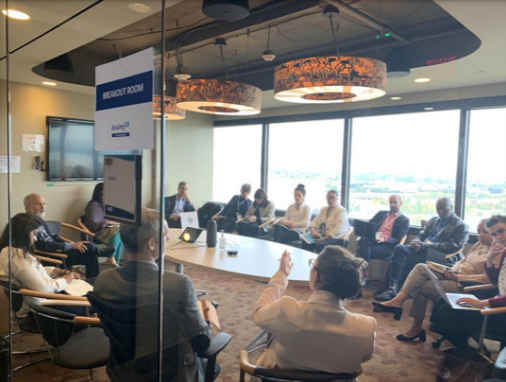
Using a modified open-space methodology, participants in this module had the chance to submit themes and issues they wanted to discuss further, effectively setting much of the agenda for day two. The four main topics identified were: engaging local ownership; the role of evidence; the role of intermediaries in scaling; and financing/funding for scale. The following morning, participants split into breakout groups covering these four issues, after which the groups shared what they discussed with the rest of the workshop participants.
The breakout group on engaging local ownership started by taking a step back to define what is meant by local ownership, and the various pathways to scale based on the different levels of ownership. Local inclusion and intermediary groups have an important link; intermediaries help to galvanize local leadership and are also often a reflection of that leadership. These intermediaries can also help to break down the silos between sectors and facilitate collaboration, which leads to impact at scale. A focus on local ownership is also important to address the inherent discrepancy between meeting the needs of donor organizations and meeting the local needs associated with scaling.
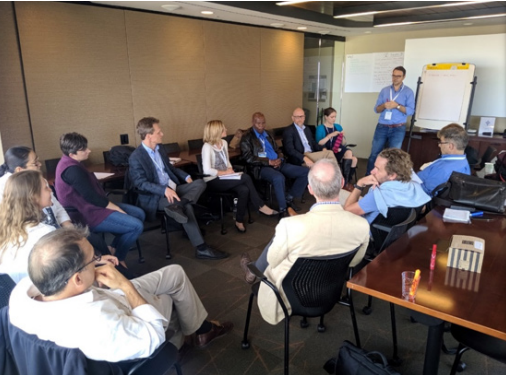
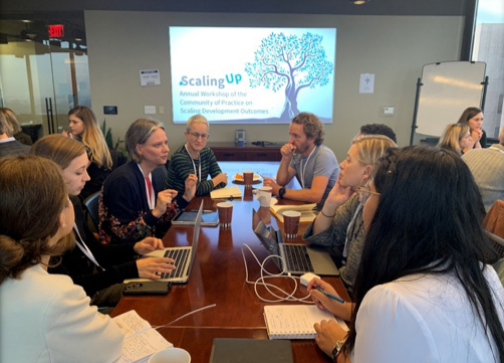
The group that discussed evidence agreed that there has been significant progress in generating evidence to support scaling initiatives, but it is not always clear how to use it. The group noted the need for a more about what types of evidence are necessary for specific stages of the intervention process and to better differentiate the differing data needs associated with private, public, or PPP scaling approaches.
The discussion on intermediaries highlighted the tensions that exist within the scaling discourse. There was diversity of thought among members on what the role of an intermediary should be in connecting innovations and innovators to funding and delivery systems. Though intermediation mechanisms are common in the private sector (e.g., venture capitalists), their role in the public and non-profit sectors is not as easy to define. The group agreed on the necessity of setting a research agenda on the nature and cost-effectiveness of intermediaries serving the public sector and the incentives and business models needed for those intermediaries to operate effectively.
The small group focused on funding and financing discussed alternative costing and financing strategies covering the transition from pilot to scale; concrete strategies for de-risking; and the emerging roles of philanthropy and impact investing. There was also much discussion about the inherent discrepancies that can occur between the ideas of the funding agencies and the needs of the community. This occurs often when donors want to diversify approaches, but the system does not support this. It was suggested that instead of spending much of their time on funding innovations, donors should instead start with the public system and work on how to build ownership there. Once the system’s problems have been addressed, then one can shift the focus to innovations. Another major theme discussed and presented by this group is the structure of funding. Often, donors are not structuring the way they finance an initiative in a way that is conducive to scale. Much of this is due to short-term, fragmented grant making. The group recommended supporting more systematic changes by pooling resources and allowing initiatives to have a little more flexibility. This pooling of resources, however, raises the question of ownership. A major concern of this group was that the pooling of resources by multiple donors would lead the receiving country to perceive this as the donors ganging up on them. Therefore, the group emphasized the importance of building public-private partnerships with local government to ease some of the burdens on early-stage scaling efforts and better inform both the implementer and the beneficiary of a scaling up intervention.
Session 5: Future of the CoP
Discussion on the CoP’s way forward centered around its virtual presence. In recent months, the development of a website for the CoP has been underway. The website will have a general CoP homepage featuring a combined calendar of all working group activities, a membership roster, and a repository of past materials. The website will include separate subpages for each of the eight working groups and a cross-sectoral bibliography containing resources from each group.
In addition to the new CoP website, the participants decided to create a discussion board function for members through a CoP LinkedIn group. It was agreed that members should begin to use the hashtag #ScalingCoP on social media to increase the CoP’s web presence.
The issue of membership, both to the CoP overall and to each working group, was also discussed. As membership has grown to include people from around the world and is increasing rapidly, logistical issues such as holding the annual workshop and maintaining the high level of interactive discourse within the CoP inevitably arise. Faced with this increase in the number and geographic diversity of members, the working groups have begun to rely on video calls and webinars as their main forms of communication. While no decision was reached on how to solve the welcome problems associated with expanding membership, it is anticipated that the combination of the CoP’s website and LinkedIn group will allow for more frequent and interactive participation from members, as well as a way to store information in one place.
In addition to the plenary discussion of the future of the overall CoP, each of the eight Working Groups also met to discuss its status and future plans.
During the workshop, Devex Reporter Adva Saldinger did video interviews on how to scale up effectively, with the following workshop attendees:
- Devyani Pershad – Pratham Education Foundation
- Liz Vance – International Youth Foundation
- Isabel Guerrero – IMAGO Global Grassroots
- Sada Danmusa – M-Space Consulting
These interviews can be found here.

Member news
Brookings/Eleanor Crook Foundation (General and nutrition)
In an opinion piece for Devex posted on 25 November 2019, Johannes Linn looks back over his experience of 15 years working on scaling development impact and extracts lessons on opportunities and challenges which will have to be addressed in the future. Chytanya Kompala complements the op-ed with a side-bar on addressing the challenge of multisectoral scaling up in nutrition.
Contact: Johannes Linn (jlinn@brookings.edu), and Chytanya Kompala (chytanya@eleanorcrookfoundation.org)
Educate! (Education)
The programs of Educate! aim to achieve skill upgrading that translates into improved education, gender, and labor market outcomes, and ultimately a higher life trajectory, with impacts at scale. A recent evaluation shows overall statistically significant, strong impacts on skills, gender equity-related outcomes, and educational attainment. These results demonstrate that participating in the Educate! Experience allows students to develop the competencies that put them on a better trajectory in areas correlated with improved long-term life outcomes.
It was too early to assess income and employment outcomes as more than 1/3 of the study sample are still in tertiary education. However, in light of existing evidence that shows that improved skills, educational attainment and gender equity-related outcomes lead to increased income, Educate! is optimistic about future economic impacts. As part of this evaluation, researchers have already secured some funding for a 7+ year follow-up to explore how these impacts evolve with more time.
Contact: Rachael Miller Buck (rachael.miller@experienceeducate.org)
CIMMYT/IFPRI (Agriculture)
The International Maize and Wheat Improvement Center (CIMMYT) and International Food Policy Research Institute (IFPRI) on 23 October 2019 orga[1]nized a one-day CGIAR-internal workshop to exchange experiences and discuss opportunities for collaboration on “Scaling of innovations”, one of the most import[1]ant challenges facing the Consortium of International Agricultural Research Centers (CGIAR) in contributing to the SDGs, especially considering the changes foreseen at CGIAR institutional level. Key insights were as fol[1]lows: (i) recognition that “scaling” is interpreted in many different ways; (ii) a need for internal behavior change to deal with scaling in a more meaningful way, which includes responsible scaling, sustainability and systems change as integral parts of scaling; (iii) innovations are a means to an end, rather than the end in itself (scaling outcomes vs scaling innovations); (iv) research centers are in a unique position to bring clarity, guidance and evidence into the discussions around scaling; (v) in addition to doing better scaling projects themselves, they need to orient their contributions to support local actors do better scaling, so they ensure scale is sus[1]tained and leads to transformation; (vi) there is a strong desire to exchange more among centers/programs and different approaches to mainstream ideas around scal[1]ing, especially around scaling frameworks and how they can be implemented systematically.
CIMMYT, SNV the Netherlands and MSI distilled essential lessons of their scientific publication entitled “Scaling, from reaching many to sustainable sys[1]tems change, a critical shift in mindset” in a blog on NextBillion.
Contact: Lennart Woltering (l.woltering@cgiar.org)
CIAT (Agriculture)
The “Knowledge Management for Development Journal” just launched a ‘Call for papers’ for a forthcoming Special Issue on “The unusual suspect? The private sector in knowledge partnerships for agricultural and rural development”. One of the areas to be addressed is scaling, and specifically what are the implications of involving the private sector in scaling as partners in innovations and knowledge processes. The issue will be published in September 2020. The journal is an open access, peer-reviewed community-based journal on knowledge management for development – for and by development practitioners, researchers and policy[1]makers. It has been published since 2005 by a team of volunteers.
Contact: Jana Korner (J.Korner@cgiar.org)
Center for Universal Education at Brookings (CUE) (Education)
In October 2019, The Center for Universal Education at Brookings published “Philadelphia Playful Learning Landscapes: Scaling strategies for a playful learning movement.” This report documents the scaling journey to date of the Philadelphia Playful Learning Landscapes initiative and key lessons learned, to help inform further expansion in Philadelphia as well as adaptation and adoption by other cities and countries. Lessons are targeted toward city-level actors—policymakers, implementers, researchers, and funders in Philadelphia and beyond—who wish to expand and sustain evidence-based approaches that foster learning and caregiver–child interactions in public spaces and everyday spaces where people regularly go and can be easily engaged. CUE published an accompanying blog. CUE also put out a podcast episode, where Jenny Perlman Robinson interviews three experienced education leaders from Jordan, Côte d’Ivoire, and Tanzania, about the role that public, private, and civil society actors can play in scaling and sustaining education programs around the globe and bringing about transformational change to education systems.
Contact: Molly Curtiss (mcurtiss@brookings.edu)
Center for the Advancement of Social Entrepreneurship (CASE) (General)
CASE produced a recent paper on scaling:
“People Matter: Evolving Talent to Drive Impact at Scale”
Building and empowering a strong team is one of the universal challenges social ventures face—and it only gets more challenging as they scale. And yet, talent is often misunderstood, overlooked, and under-resourced. People Matter, from the Scaling Pathways series, draws hard-won insights and strategies from the field to help social ventures navigate this talent challenge during scale. Topics include local talent, organizational culture, human resource infrastructure, volunteers, non-monetary incentives, DEI (diversity, equity, and inclusion), and more.
CASE also issued four Scaling Snapshots: Journeys of Four Successful Social Ventures:
- After rapid expansion, Fundación Capital notes that its scaling success is the result of deeply engaging multiple stakeholders from all sectors.
- As it scaled, One Acre Fund found that taking strategic pauses was vital to sustainable and high impact growth.
- To expand impact beyond its six core countries, WSUP identified short and medium-term consulting as a less resource-intensive path, which led to the creation of a hybrid structure.
- On its journey to impact, Living Goods has an aggressive scaling strategy of direct expansion, assisting other implementing organizations, and government partnerships, while it homed in on the non-negotiables to achieve scale.
Contact: Kimberly Bardy Langsam (Kimberly.langsam@duke.edu)
Eleanor Crook Foundation (ECF) (Nutrition)
ECF’s Chief Executive, William Moore, published an op-ed on scaling nutrition in the Devex newsletter on November 6, 2019. His op-ed outlines the inherent tensions between multi-sectoral approaches and principles of scaling. According to the op-ed, “if we want to end malnutrition by 2030, we are going to have to develop and scale radically improved solutions to address malnutrition at a much faster pace than we have historically seen.” This requires a retrospective analysis of what’s worked, and what hasn’t, at scale, and what that means for the path ahead.
Contact: Chytanya Kompala (chytanya@eleanorcrookfoundation.org)
Emergency Nutrition Network (ENN)/Scaling Up Nutrition (SUN) (Nutrition)
ENN compiled a synthesis of lessons learned across several thematic areas on nutrition around scale up in Scaling Up Nutrition (SUN) countries, drawing on rich content captured in its publications Field Exchange and Nutrition Exchange.
ENN will also be synthesizing learning from the SUN Movement Global Gathering in Nepal in November 2019 (including all 25 or so workshops). An overview of ENN’s work regarding SUN can be found here.
Contact: Marie McGrath (marie@ennonline.net)
ExpandNet (Reproductive health)
ExpandNet is pleased to share that Dr. Rebecka Lundgren, after many years of service to Georgetown University’s Institute for Reproductive Health, has joined Peter Fajans, Laura Ghiron, and Ruth Simmons, as the newest member of the ExpandNet Secretariat. Rebecka recently joined the Center on Gender Equity and Health at the University of California-San Diego Department of Medicine where she will continue her work applying the ExpandNet framework and approaches to the scale up of social norms interventions, with a special focus on youth sexual and reproductive health and gender relations. Other news is that the ExpandNet website has been updated to better provide our guides, resources and publications as well as a comprehensive and thoroughly-linked bibliography. The bibliography includes a range of published and grey literature resources, websites and reports that directly address and/or provide valuable insights on the topic of scale up. Included are materials from a range of global health and development technical areas as well as the various sciences relevant to scale up. ExpandNet is pleased to announce that we are launching a listserv to help keep our community apprised of periodic developments and updates in the field of scale up. To sign up, please see the bottom of any page on the ExpandNet website. Lastly, ExpandNet’s work featured prominently at the October 2019 Global Implementation Conference where the team delivered a “master class” on scaling up complex improvement in low-income settings as well as served on a State of the Field plenary panel focused on the topic of implementation practice.
Contact: Laura Ghiron (ljghiron@umich.edu)
Global Environmental Facility (GEF) (Environment)
The Independent Evaluation Office of the GEF prepared an evaluation of scaling up in GEF-funded projects. The report was presented to the GEF Council at the June 2019 Council meeting. The unedited report can be accessed here. The main findings were distilled into three blogs: Want to scale up? Change-proof your program! Lessons from the GEF (PART 1); Want to scale up? Change-proof your program! Lessons from the GEF (PART 2); Are We Bigger Yet? A Behavioral Approach to Assessing Scaling-Up. The final published report should is expected to be published soon on the scaling-up report webpage.
Contact: Jeneen Reyes Garcia (jgarcia2@thegef.org)
GIZ (Agriculture)
Testing and prototyping innovations are essential elements of the “Sustainable Use of Rehabilitated Land for Economic Development” (SURED) project in Ethiopia which is financed by the German Ministry for Development and aims to scale-up proven approaches in the agriculture sector in Ethiopia. GIZ supports the Ethiopian Ministry of Agriculture (MoA) to develop strategies for scaling-up innovative solutions which focus on rehabilitating and protecting land through sustainable land use. The project and its predecessors have been supporting the rehabilitation of an estimated total of around 600,000 hectares of land in the Ethiopian highlands. Now, SURED is focusing on adopting and disseminating these solutions beyond the pilot intervention areas. The team is currently defining products for larger scale implementation, such as community managed natural resource governance, protection through production and participatory land use planning. However, SURED does not only intend to promote best practices but goes a step beyond. The project aims to enable the Ministry to adopt and integrate the scaling-up methodology and processes into its own management system. In the long run, integrating scaling-up principles are expected to support the efficiency of implementing large volume public investment programs.
Contact: Anna Hirsch (anna.hisch@giz.de), and Tewodros Gebreegziabher (tewodros.gebreegziabher@giz.de)
IDRC/Farm Radio International (Agriculture)
IDRC supports a Webinar series to explore the use of ICTs in scaling up agricultural solutions. The first in a series of webinars asks: How can one scale-up agricultural solutions that are promising? What role do Information and Communication Technologies (ICTs) play in this process? Through a 30-month research initiative, Farm Radio International and Farm Radio Trust (Malawi) aimed to come up with some answers that are explored in this webinar. This webinar includes: 1. The main findings, informed by the experience of a multitude of development projects around the world; 2. Real-world experience from the research team in Malawi; and 3. Practical advice on how to think about scaling-up projects and initiatives for superior results. Future webinars will, inter alia, focus on ICT4Scale Strategies, ICT4Scale & Gender, and ICT4Scale & M&E. The next webinar is scheduled for release in December 2019.
Contact: M. Leclair (mleclair@farmradio.org)
ILRI (Agriculture)
To help get ILRI staff up to date on the latest thinking about scaling research, ILRI organized a “scaling workshop” 12–13 September 2019 with three key goals:
- to highlight the importance of planning for impact early in the project development process
- to better understand the concept of scaling and recent thinking on scaling, and
- to provide ideas of how researchers can incorporate scaling elements into their proposals and projects.
Contact: Iddo Dror (ILRI) (I.Dror@cgiar.org)
ILRI/African Development Bank (Agriculture)
The Technologies for African Agricultural Transformation (TAAT) program, funded by the African Development Bank aims to transform African agriculture into a competitive sector by deploying and scaling productivity enhancing technologies. The International Livestock Research Institute (ILRI), is working with partners in Sub-Saharan African countries to scale proven technologies in livestock value chains for improved livelihoods. Identified technologies include: improved poultry and small ruminants genetics, animal fattening practices for youth employment, livestock feeds for improved nutrition, soil, water and environment conservation. Challenges include a non-uniform understanding of scaling and weak integration into national agricultural systems.
Contact: Niyi S. Adediran (ILRI) (A.Adediran@cgiar.org)
IMAGO (Social enterprises)
IMAGO organized a hands-on course in 16-17 October 2019 on “Scaling Up for Social Impact” to help organizations take their social innovations to the next level. Designed and led by Harvard Kennedy School and Georgetown faculty and drawing from over a decade of extensive research on scaling up in different institutional settings, this clinic helped answer some of the critical questions organizations often face as they look to scale up. It provided an analytical framework to help organizations understand the different pathways to scale, and challenged participants to rethink and reassess the strategy, operations, and systems needed to reach it.
Contact: Isabel Guerrero (iguerrero@imagogg.org)
J-PAL (Education)
J-PAL recently published a video highlighting their decades long partnership with Pratham to test, adapt, and scale up Pratham’s Teaching at the Right Level (TaRL) program. In the video, Pratham CEO Rukmini Banerji and J-PAL co-founder and 2019 Nobel Laureate Abhijit Banerjee reflect on their work and on Pratham’s strategic use of randomized evaluations to inform the scale up of an evidence-based education approach.
Teaching at the right level (TaRL) is an approach developed by the Indian NGO Pratham that aims to build foundational skills in math and reading for all children before exiting primary school. At the instructional level, the approach works by assessing children’s learning levels using a simple tool; grouping children based on learning levels rather than age or grade; using a range of engaging teaching and learning activities; and focusing on foundational skills rather than solely on the curriculum; and tracking children’s progress. When TaRL is implemented within government systems, Pratham helps ensure that teachers receive strong academic support through mentors who are part of the government system. Ongoing, onsite monitoring and support, as well as reviews at different levels of the school system, all contribute to the effectiveness of the program. A series of randomized evaluations by J-PAL affiliated researchers over the past fifteen years have shown that TaRL consistently improves learning outcomes when implemented well and has led to some of the largest learning gains among rigorously evaluated education programs. The iterative process of innovation and evaluation in collaboration with J-PAL has helped Pratham to refine and adapt TaRL over time, which has now reached over 60 million children in India and Africa.
Contact: John Floretta (jfloretta@povertyactionlab.org)
Mastercard Foundation (Education)
Secondary Education in Africa: Preparing Youth for the Future of Work examines progress in secondary education in Africa to propose forward-looking recommendations. Mastercard Foundation, together with a group of strategic partners, has initiated a research project to look at the role of secondary education in preparing African youth for the future of work, with emphasis on ensuring youth acquire the skills, knowledge, and competencies necessary to succeed in a dynamic and globalized labor market. Under its auspices, a paper was prepared on “Information and Communications Technologies and Secondary Education in Sub-Saharan Africa: Policies, Practices, Trends and Recommendations”. It discusses the use of Information Communications Technologies (ICTs) to improve access to, quality of, and delivery of secondary education within sub-Saharan Africa. It discusses the policy environment for ICTs in sub-Saharan Africa, their successes, challenges, and lessons learned, and it concludes with a broad and detailed set of recommendations for policy makers, donors, the private sector, designers, and implementers of ICTs in education programs. The report seeks to generally answer the question of how sub-Saharan African (SSA) governments can best use technology to improve access to secondary education, improve learning, strengthen management of schools and the education system, and foster innovation.
Contact: Mary Burns (MBurns@edc.org)
Million Lives Club (General)
The Million Lives Club (MLC), an initiative set up to challenge the narrative that few innovations reach sustainable scale, was officially launched at SOCAP on 22 October 2019. This multi-partner initiative celebrates innovators and social entrepreneurs who are successfully scaling to improve the lives of those living on less than $5 a day. The inaugural 44 Members are spread across 3 cohorts: Vanguard (celebrating those who have directly impacted 1,000,000+ clients with their innovation), Voyager (recognizing innovations expected to impact 1,000,000+ clients within 18 months), and Pioneer (highlighting innovations that have scaled to meet the needs of a significant proportion of their target populations). The MLC is accepting applications on a rolling basis, so innovators and social entrepreneurs are strongly encouraged to apply. Submissions received by Friday 10th January 2020 (12:00 EST) will be considered for inclusion in the next group of MLC Members, which will be announced in Spring 2020. If you would like to find out more, or are interested in joining our growing network of partners, contact us at admin@millionlivesclub.org.
Contact: Laura Rose Brown (lbrown@r4d.org)
PERFORM2Scale (Health)
A new briefing paper has just been released by the PERFORM2Scale consortium. This EU-funded program takes a health management strengthening intervention, successfully tested in the earlier PERFORM project, and up scales it for a sustainable impact. The briefing paper summarizes the results of a consortium-wide review after 18 months into the implementation component of the program, and outlines progress to date in each of the participating countries – Ghana, Malawi and Uganda. The evaluation reveals that so far the program is functioning effectively, and there have been real successes.
From a management strengthening perspective it looks at the progress District Health Management Teams have made in identifying and tackling service delivery problems, and the management competencies they have gained. With regard to scale-up the brief considers the facilitators and challenges of scale-up, the progress in securing resourcing and infrastructure, and success in fostering champions. The paper also provides a background to PERFORM2Scale and its main principles and processes.
Contact: Karen Miller (Karen.Miller@lstmed.ac.uk)
Purdue University (Agriculture)
Following the highly successful Scale Up conference that was held at Purdue University in fall 2018 the Scale Up website remains an archive of the event and a repository for related materials. One of the most important and tangible outputs from the conference was the Scale Up Sourcebook, coauthored by Larry Cooley and Julie Howard. A “soft launch” of the Sourcebook was held at the National Press Club on April 10th, 2019. Martin Fregene from the African Development Bank presided over that meeting and Julie Howard moderated an informative panel discussion. A free copy of the Sourcebook can be downloaded here. More recently, on September 4th, 2019, Purdue organized a policy forum on “Scaling Models for Agricultural Transformation” at the African Green Revolution Forum in Accra. This four-hour event, co-organized by the African Development Bank, Syngenta Foundation, USAID and Purdue, was designed to address key issues related to the challenge of scaling agricultural innovations. The forum served as the “hard launch” of the Sourcebook, and more than 200 copies of the Sourcebook were distributed at the event. Highlights and key takeaway messages from the policy forum are provided in a 4-page summary. At present, Purdue’s College of Agriculture is considering potential next steps to maintain momentum on this important topic and will continue to coordinate efforts whenever and wherever it can.
Contact: Gerald E. Shively (shivelyg@purdue.edu)
Scale-Up Community of Learning Collaborative to Advance Social Norms (Health)
In 2017/2018, the Scale-up Community of the Learning Collaborative (LC) developed the “Considerations for scaling up norms-shifting interventions for adolescent and youth sexual and reproductive health”. This guidance document is for managers of community-based adolescent and youth reproductive health projects that seek to shift the environment surrounding young people, and after initial success and testing, want to take their intervention to scale. Some features of make norms-shifting interventions make them unique from other adolescent and youth reproductive health projects. They are designed to encourage communities to reflect on and debate social norms that can negatively affect adolescent and youth reproductive health. Norms-shifting interventions often lead initially to social pushback by communities. Project staff and partners need to understand these unique features and how to mitigate social pushback when it occurs during scale up to new areas. Drawing significantly from ExpandNet’s scale-up framework, the guidance document is organized by the transitions that occur when moving from pilot to early scale up, and when moving from early scale up to larger expansion. The LC experience is that different scale-up issues may arise at different phases of expansion and institutionalization. Many interesting case studies and resource links are interwoven throughout the guidance document.
The Learning Collaborative to Advance Normative Change is currently working on a series of webinars, produced by each learning community (Social Norms Theory, Measurement and Scale-Up). On December 5th from 9:30-10:30 am (EST), the Scale-Up community will present “Yes We Can! Taking Norms-Shifting Interventions to Scale”. The tentative agenda will feature practical insights from the Young Men’s Initiative (YMI) in the Balkans, which successfully scaled beyond national borders, critical considerations for scaling norms-shifting, and reflections on scale-up challenges and lessons from interventions reaching young people beyond community-based approaches. Please register through zoom for the webinar.
Contact: Cait Devin (Cait.Davin@georgetown.edu), and Susan Igras (smi6@georgetown.edu)
WHO (Family planning)
In 2018, WHO in collaboration with ExpandNet and other stakeholders embarked on a process to synthesize tools for Scaling Up FP Interventions into a user friendly, electronic “Concise Guide to Implementing @ Scaling Up Family Planning Service Improvements”.
The intention with this guide is to provide a “how to” resource with information about the various tools and resources needed for scale up. Material was adapted from the WHO ExpandNet Guides for Scale Up. The Concise Guide is organized in five phases that will guide the practitioner through a concerted and deliberate process: 1. define the need for change; 2. plan for a demonstration of pilot test of a programme innovation; 3. conduct the demonstration; 4. plan for scale-up and go to scale; and 5. M&E. The guide outlines a process that must be participatory, listening to and learning from a wide range of stakeholders, especially the health services organization adopting the innovation and their clients, the consumers of health services. All sections include links to key resources. The tool was published in 2018, led by WHO/RHR/IBP with contributions mainly from ExpandNet. The development of the tool was supported by Bill & Melinda Gates Foundation, WHO FP Umbrella project.
“Task sharing for family planning services, Burkina Faso” by Tieba Millogo et al. reports that in Burkina Faso the coverage of services for family planning is low due to shortage of qualified health staff and limited access to services – only 15% of married women used modern contraceptives in 2010. Following the launch of the Ouagadougou Partnership, an alliance to catalyze the expansion of family planning services, the health ministry created a consortium of family planning stakeholders in 2011. The consortium adopted a collaborative framework to implement a pilot project for task sharing in family planning at community and primary health-care center levels in two rural districts. Adoption of new policies and clinical care standards expanded task sharing roles in family planning. Supportive supervision cascades were critical in ensuring success. The pilot project was feasible and safe; however, financial constraints are hindering scale-up efforts.
Contact: Asa Kristina Cuzin-Kihl (cuzina@who.int)
Publications we would like to share
Social Welfare
Systematic Scaling Review: Call for input on a Campbell systematic review “Strategies for scaling up the implementation of interventions in social welfare” available here.
This review is being led by Luke Wolfenden, Bianca Albers, and Aron Shlonsky and Meghan Finch. The authors are seeking unpublished relevant studies or reports evaluating interventions to scale up effective social welfare interventions. Please note that the authors have already completed a systematic search of academic databases as such, this request does not extend to published literature. Please email Meghan (finch@ceiglobal.org) with any relevant information.
Nutrition and Food Security
“Special focus: How the UAE is leading the charge in food security” by Georgia Tolley, 1 September 2019
Rising populations, dwindling fresh water supplies and the continued threat of global warming mean food security is pushing itself onto the agenda of desert countries and developing nations. Questions remain as to whether high tech farming can deliver solutions and feed the masses, but soon it might not seem such a strange idea to farm fish on land or grow tomatoes in the desert. UAE agrobusiness and government look to scale innovative agricultural activities for food security with high-tech farms, pilot schemes and research projects that demonstrate a paradigm shift in the UAE’s approach to farming. They are currently in the development phase and have so far have relied on wealthy backers to get off the ground, but their track record is attracting interest from around the world. The farms have created a market for premium, locally-grown produce in the UAE. The companies profiled insist that millions of dollars of seed funding is set to flood into UAE agriculture before the end of this year, and with on-going government support, agtech in this desert land has the potential to bloom. Once scaled up, climate-controlled farming should bring bigger profits.
“Q&A: The future of food is biofortified, says plant breeding pioneer” by Teresa Welsh; 29 July 2019
The future of food is biofortified. 2016 World Food Prize winner Howarth Bouis explains why biofortification is such a cost-effective nutrition intervention and the challenges that remain to achieve scale.
“Is it time to take ‘more of a gamble’ to scale nutrition interventions?” by Teresa Welsh; 12 July 2019
With 10 years left to meet the Sustainable Development Goals, the world is not on track to meet Goal 2 of ending hunger and improving nutrition. The international community is mobilizing to try to meet the goal, but different groups working on the issue do not always have the same approach. Some focus most intently on nutrition-specific interventions, while others believe a multisectoral and nutrition-sensitive approach is the best way to achieve scale for improved nutrition. Is one approach more effective?
Monitoring and Evaluation
“Evaluation of transformational change: Opportunities and challenges for the Sustainable Development Goals” by Rob D. van den Berg, Cristina Magro, Silvia Salinas Mulder Editors International Development Evaluation Association (IDEAS), 2019
Climate change and environmental problems cannot be solved without thinking about systems and without addressing explicit development trade-offs. These problems can be understood better if we think about transformational change (“deep, systemic, and sustainable changes with large-scale impacts in a significant area of concern”). Good impact evaluations in the past showed, for example, how a single budgetary program had good results on education attainment in rural areas in Mexico. But these rigorous impact evaluations cannot address complex systems like the ones needed to understand what can be done, and needs to be done very soon, in order to improve the quality of our environment. Systems evaluations for transformational change are the answer, according to this important book.
Health
“$5 eyeglasses” by Rebecca Root; 23 September 2019.
Global Vision 2020 founder Kevin White discusses the innovation bringing eye care to last-mile populations — without the need for optometrists.
“Uzbekistan tests innovative financing model for hepatitis” by Rebecca Root; 29 July 2019
The Center for Disease Analysis Foundation — a nonprofit organization that studies complex diseases and helps countries deliver effective elimination strategies — is spearheading an innovative pilot project to help fill the $6 billion annual funding gap for tackling hepatitis in low- and middle-income countries. Fronting the initial $1.16 million needed to jump-start the program, CDAF is working in partnership with the Uzbekistan Research Institute of Virology and with the support of the Uzbekistan Ministry of Health to screen 250,000 people for hepatitis B and C within a year, as well as treat an estimated 21,000 infected patients in Uzbekistan.
“Straight Up Conversation: Bridge in Nigeria Chief Oladapo Olarinmoye”, Interview by Rick Hess, 5 September 2019
Oladapo Olarinmoye is managing director of Nigeria for Bridge International Academies. Over the last decade, Bridge has helped educate half a million children worldwide living in extreme poverty. In Nigeria’s Edo State, where 60 percent live below the poverty line, Bridge is upskilling the teachers of around 300,000 children in 1,500 schools over four years, a rate of scaling which may be unprecedented in African history. Oladapo has decades of operational management experience in Nigeria and has served on primary school boards in Lagos. I recently talked with him about what Bridge is doing in Nigeria, and here’s what he said.
Education
“Educate A Child launches strategy to get most-marginalized kids into school” by Sophie Edwards, 21 November 2019.
Educate A Child, the world’s only fund dedicated to enrolling out-of-school children, has unveiled a new strategy to help countries get the hardest-to-reach kids into the classroom.
Climate Change
“Scaling up climate technology action” by Ines Omann, Moritz Kammerlader, Jill Jäger, Alexander Bisaro and J. David Tabara; August 2019
Assessing opportunities for scaling out, up and deep of win-win solutions for a sustainable world: Win-win solutions (WWSs) that reconcile climate with economic goals offer a new suite of opportunities to build the necessary economic conditions for achieving a good life for all and reaching the Sustainable Development Goals. However, a systematic assessment of such solutions is still missing. Addressing this gap, a Global Dialogue on win-win solutions was implemented within the GREEN-WIN project to (1) co-develop a vision about ‘which kind of economy do we want for which kind of world?’, (2) identify exemplary WWSs in diverse domains of action and (3) evaluate the possibilities to scale win-win solutions and thus contribute to changing current core economic practices. The assessment focuses on the potential of ‘scaling out, up and deep’ of solutions to attain a vision of a sustainable world. It finds that critical factors for scaling such experiences across the globe are initiating and facilitating opportunities for sharing information and knowledge, boosting multi-stakeholder collaboration, and co-creating and building transformative capacities, while ensuring financial support for niche experimentation.
General
“How to transition a project from international donor to local government” by Anuradha Khana; 10 September 2019
A successful project handover in Tanzania illustrated three major lessons for ensuring sustainable development programming. Global Health Advocacy Incubator’s Anuradha Khanal explains:
- Local leadership
- Alignment with public priorities
- Advocacy capacity-building
